The Cost of Caring: Coping with Compassion Fatigue

In this article
Compassion and empathy are important in almost all aspects of our life. They create a sense of belonging and allow us to establish connections and build meaningful relationships with other people – friends, loved ones, and co-workers. These feelings can be deeply rewarding, but they can also come at a cost.
Sometimes, empathy can begin as a selfless act of care for those who are suffering around you. Still, if you don’t preserve your own well-being in that process, it can eventually become overwhelming, and you might find yourself growing numb to their suffering. The result is compassion fatigue, which is often described as the cost of caring for others or their emotional pain. You may feel that empathy and compassion stop coming naturally, and that might make you feel extremely tired, helpless, guilty, and numb.
Compassion fatigue is a serious problem that can undermine your mental and physical health and negatively affect your relationships and ability to care for others. In this article, we’ll outline some symptoms of compassion fatigue and talk about how to deal with it and revive your empathy while supporting people around you.
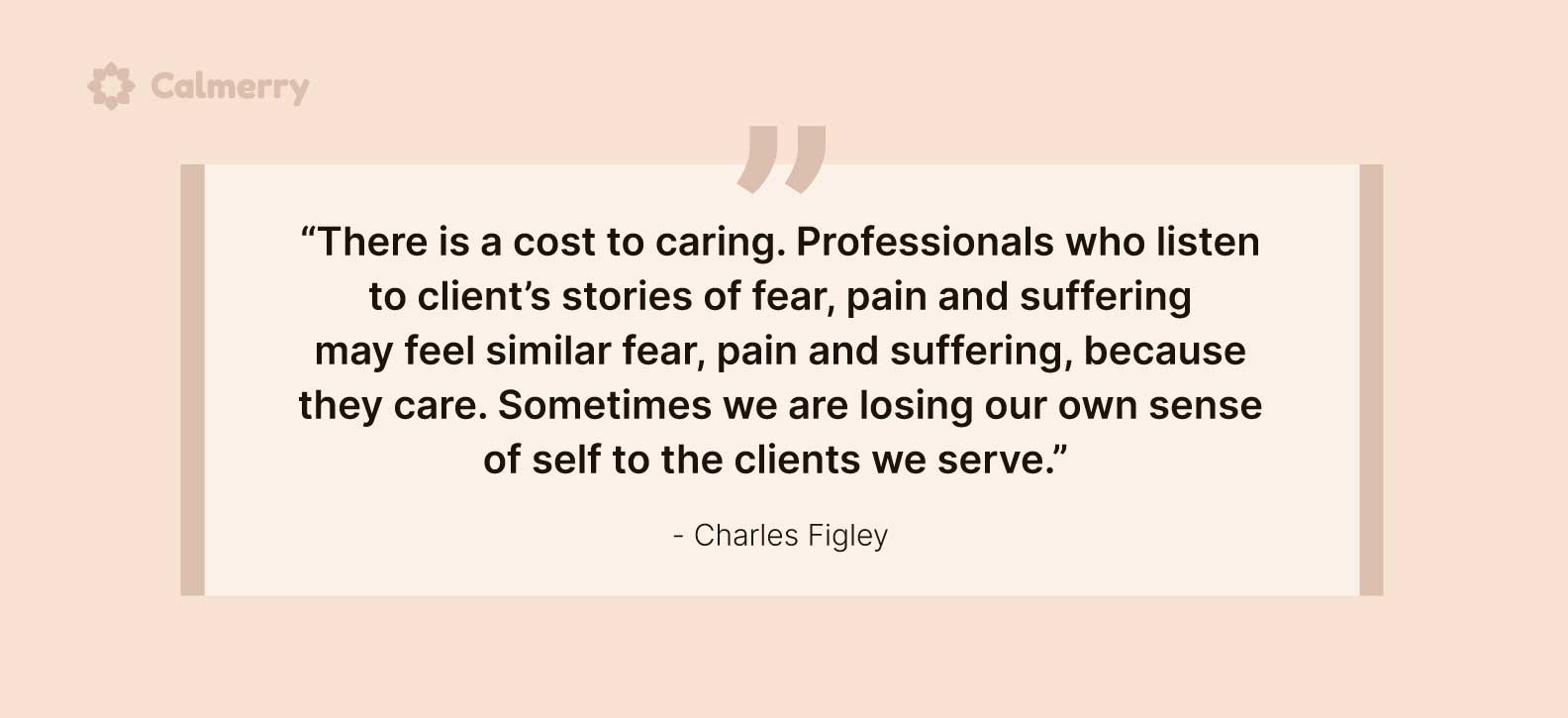
What is compassion fatigue?
The term compassion fatigue was first introduced by Charles Figley in the 1980s. It describes the physical, emotional, and psychological impact of helping other people suffering from the consequences of traumatic events. Compassion fatigue is also known as second-hand shock, secondary stress reaction, secondary traumatic stress, or vicarious trauma.
When we frequently contact traumatized people, we become preoccupied with their suffering or pain. Over time, our concern and empathy for the people we are trying to help expose us emotionally to the negative side effects associated with prolonged stress and trauma. Eventually, it can become increasingly exhausting to emphasize and maintain compassion.
Who is at risk?
Compassion fatigue is most common among health care professionals who provide direct patient care – nurses, physicians, physical therapists, occupational therapists, trauma therapists, social workers, and workers in child protective services. They are asked to show empathy in a work setting and can quickly develop compassion fatigue from emotional demands. In fact, compassion fatigue is a contributing factor in why many professionals in these fields leave their jobs to pursue other kinds of work.
But compassion fatigue can affect anyone who has to care for or about others, including teachers, journalists on the front lines of war and disaster, full-time caregivers, advocates for victims of domestic abuse, and people who are particularly empathetic. People who regularly experience vicarious trauma come to share victims’ feelings of heartbreak and devastation and often neglect their own self-care and inner life. They struggle to cope with secondary trauma that can lead to total exhaustion of their mental and physical state.
Unsurprisingly, informal caregivers who are responsible for providing full-time care for their loved ones are also susceptible to developing compassion fatigue. Consider someone whose “job” is providing care for their partner with cancer or a parent with Alzheimer’s disease. They care for a person who’s emotionally and physically distressed and have limited options for providing comfort.
Informal caregivers take on their roles out of love and look after their family members and even close friends. The fact that informal caregivers are emotionally invested in their loved one’s well-being leaves them especially vulnerable. Caregiving can be emotionally demanding and physically exhausting, and when it becomes too much, caregivers can experience a weakened sense of empathy for those in their care.

Today, compassion fatigue is no longer unique to certain professions. With increased media exposure to suffering worldwide, it’s likely that anyone can experience compassion fatigue – especially people with high levels of empathy.
Every day we hear news stories about injustice, political division, mass shootings, natural disasters, hate crimes, epidemics, and international conflicts, so it can become overwhelming to stay informed and engaged.
The 24-hour coverage of current violent news events on TV and social media can cause stress, make you feel despair, and limit your ability to feel empathy. Eventually, you start feeling exhausted, and your ability to emphasize starts to wane.
In a poll fielded March 1-3, 2022, by the American Psychological Association, 73% of adults said they were overwhelmed by the number of crises facing the world right now. And 80% reported the Russian invasion of Ukraine was a significant source of stress. So if you’re feeling distressed by the war in Ukraine, you’re not alone.
A lot of people may be experiencing anger, fear, anxiety, hopelessness, helplessness, uncertainty, and numbness because of being overloaded with stories and images of war crimes. These feelings are normal because they’re natural responses to traumatic events, even if you’re not experiencing them directly.
But if you understand how the flow of information about the war in Ukraine is impacting your mental health, you should take steps to take care of yourself. Watch this video by Calmerry, where Dr. Nishi Bhopal provides 8 tips on how to cope with emotions many of us are experiencing because of the war in Ukraine.
An empathetic person who is acutely conscious of societal needs but feels helpless to solve them may also experience symptoms of compassion fatigue. People who actively engage in charity or volunteering may start feeling that they just can’t commit any more energy, time, or money to the plight of others. They may feel overwhelmed by numerous pleas for support and helpless, understanding that the world’s challenges are never-ending.
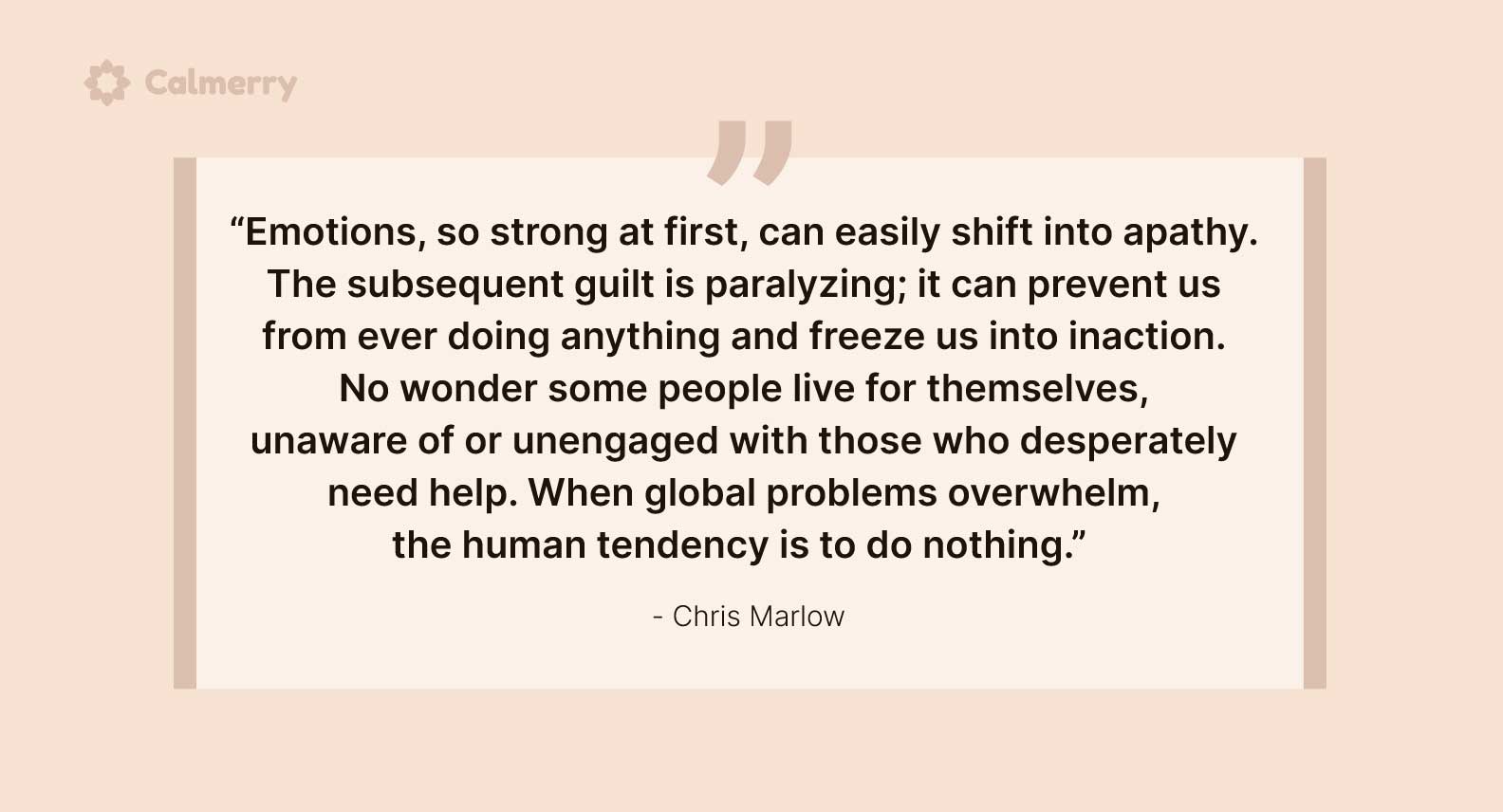
Some people may notice it in their personal lives, or feel compassion fatigue only towards certain people. For example, although we might care deeply for someone in our life who’s struggling, we might find ourselves feeling devoid of empathy if a person relies on our support indefinitely.
Signs of compassion fatigue
Compassion fatigue tends to have a rapid onset of symptoms. And there are certain warning signs that can indicate that you, or someone you know or work with, might be developing compassion fatigue. Here are some of the common emotional, physical, and behavioral symptoms to watch out for and act on them:
- Physical or emotional exhaustion
- Difficulty sleeping or experiencing nightmares
- Unexplained pains and aches
- A feeling of being on edge
- Lack of motivation
- Increased anxiety, sadness, anger, and irritability
- Issues with time management
- Feeling detached, numb, and emotionally disconnected
- Difficulty separating work from personal life
- Inability to maintain the balance of empathy and objectivity
- Decreased pleasure in helping others
- Withdrawal from social connections and self-isolation
- Changes in appetite
- Increased use of alcohol or other drugs
- Difficulty concentrating and making care decisions
- Loss of interest in activities you used to enjoy
- Feeling of failure and pessimism
This list of symptoms isn’t exhaustive and not exclusive to compassion fatigue, which can show up differently to everyone. So if you’re experiencing any combination of these reactions, it’s better to make an appointment with your doctor or a mental health professional to talk about your concerns. Being proactive is one of the best ways to prevent long-lasting emotional issues. Remember: if compassion fatigue is left unaddressed, it can develop into clinical depression or PTSD.
Compassion fatigue and burnout
Although compassion fatigue is sometimes called burnout, it’s a different concept. When we’ve been stressed for a long time, we can reach a state of physical, mental, and emotional exhaustion that is called burnout. Burnout is typically the result of daily stressors like work and parenting responsibilities, although it may have a range of causes. It builds up and takes hold gradually over a period of time.
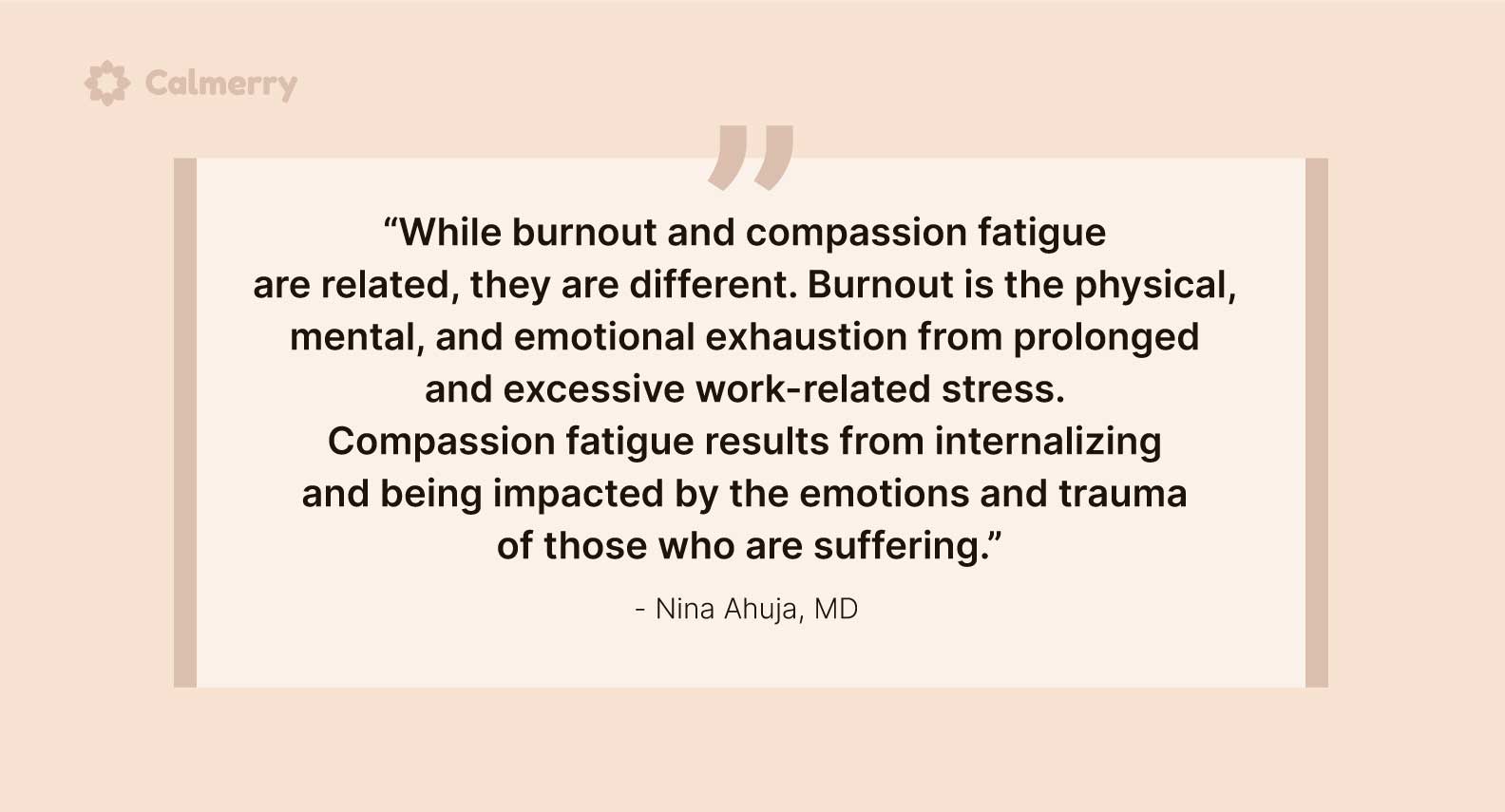
Compassion fatigue encompasses a much greater level of stress and exhaustion. It’s the result of prolonged exposure to compassion stress and trauma of others. It occurs when you’re unable to save someone from their suffering, and you become preoccupied with their pain and feel distressed. The symptoms of compassion fatigue may look similar to post-traumatic stress disorder (PTSD). If managed early, compassion fatigue has a quicker recovery time than burnout.
How to deal with compassion fatigue
Many people find meaning and fulfillment in helping others and offering compassion to those in need. But at the same time, caring for others is a deeply emotional and resource-demanding process because you are exposed to other people’s trauma. The more you open yourself up to others’ pain, the more likely you’ll come to share victims’ feelings, and that may begin to take a toll on you.
It’s human nature to feel guilty when you’re not feeling as sad as you think you should about another person’s situation, so you shouldn’t beat yourself up about it. But you should remember that compassion fatigue can be a clear sign that you’re not taking care of your own mental and physical health.
So what should you do when showing compassion to others feels like a burden? When you recognize that you’re experiencing compassion fatigue, you should take steps to work through it. There are effective strategies that will help you cope with compassion fatigue, develop resilience, and build strength.
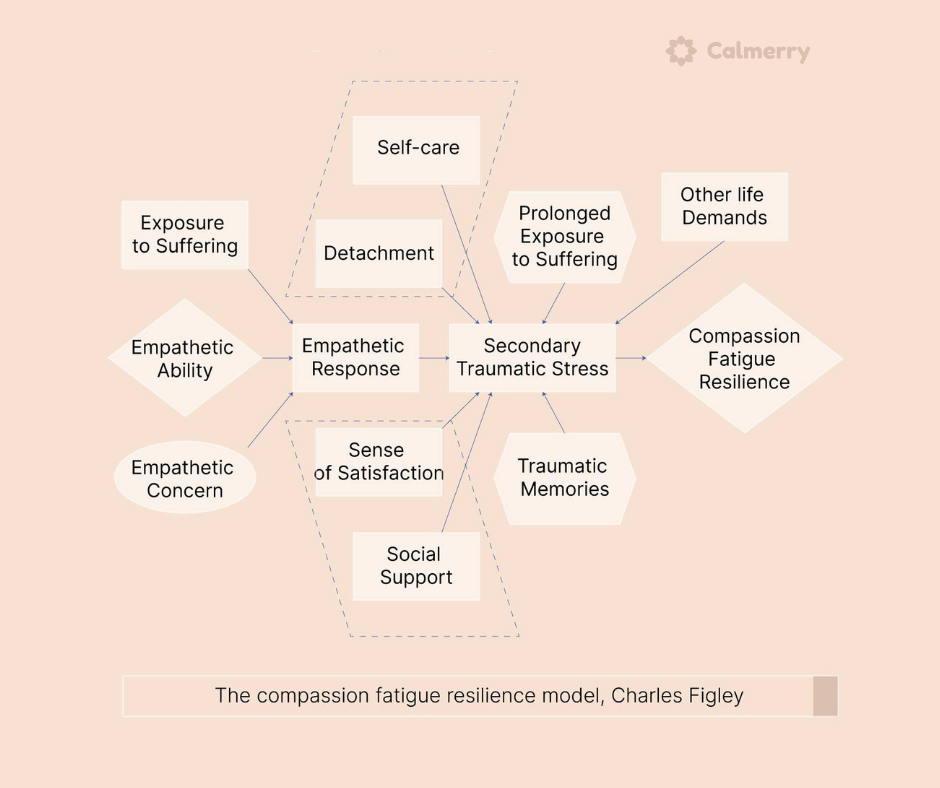
Find your own source of empathy
People who experience compassion fatigue often feel as if they give more support to others than they receive. So you should seek out someone who can provide you with care and understanding in a way that meets your needs. Try to reach out to the people in your life who empathize with you because it can help you feel more emotionally available.
That means you should find a person who’ll serve as an empathetic listener. You can share your concerns with a member of your family, a close friend, or a licensed therapist. That will help you recharge emotionally and relieve the weight of compassion fatigue.
Set boundaries
You may feel that it’s selfish to set personal boundaries, but in fact, setting boundaries is a sign of a healthy relationship. What if someone is demanding your empathy, but doesn’t show any respect for your own well-being? Or what if that person continues to struggle despite all your support? That may make you feel guilty for not knowing how to help them all the time.
But you don’t have to be everyone’s teacher and try to control the outcome all the time. Perhaps, it’s time to step back and reevaluate everything. Remember that you always have the choice to walk away, so consider removing yourself from this situation. You may suggest to that person that they should seek professional help. Perhaps it will be the best option for both of you.
Remember that you are not responsible for fixing everyone’s problems
Being empathetic allows you to understand how another person might be feeling in their current situation. But you might also be trying to step in too far and help fix their problems. You may take on their responsibilities, overextend yourself, and end up ignoring your own needs or obligations to yourself.
So if you find yourself too exhausted to empathize with your friend who is going through a tough time, it might be because you feel responsible for their happiness. You just go beyond compassion to search for possible solutions on their behalf, and that makes empathy too arduous.

You should remember that many people will simply appreciate it if they have a shoulder to cry on. And often, people just value an active listener. They need someone they can vent to and are not looking for help or any suggestions on how to fix their situation. So you should reframe your perspective. Try to see your empathy not as guidance but as a form of active listening. Then you’ll feel less apathy when you’re asked to show compassion. And more than likely, other people will appreciate your attentiveness.
Practice self-compassion
Helping others starts with you, so don’t be tough on yourself. Love yourself and practice self-compassion. According to Kristin Neff, who defined and introduced this concept, there are three components to self-compassion:
- Being kind when we fail at something or when we’re hurt
- Seeing our common humanity – accepting and forgiving our flaws because no one is perfect
- Being mindful of our emotions and thoughts
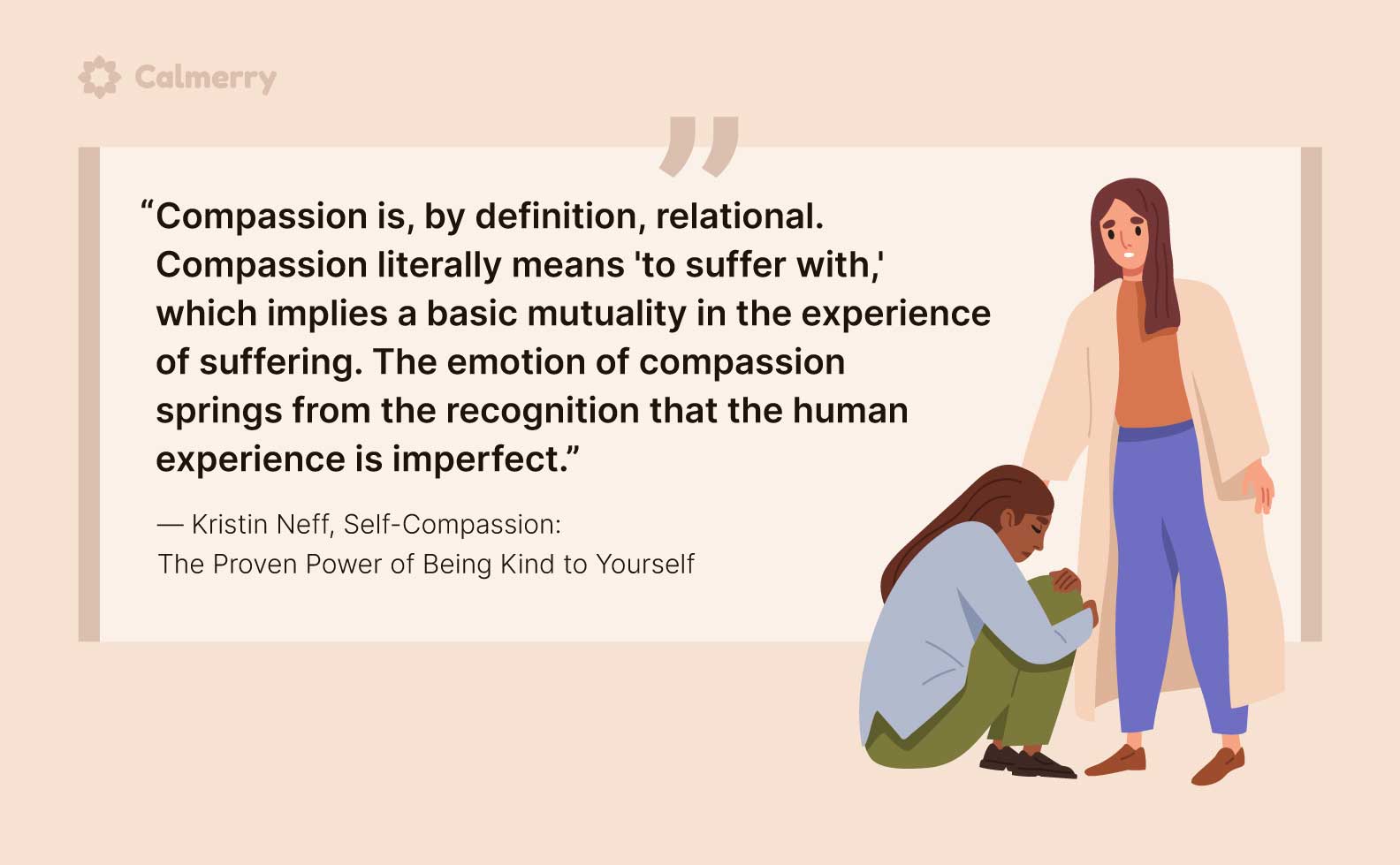
Create a self-care plan
Many of us find it hard to prioritize self-care when caring for others. But it’s important to make self-care a priority because it will keep you physically and mentally healthy and can protect you against compassion fatigue. Remember that you can’t effectively help others if you’re experiencing your own emotional crisis.
Each of us has a different way of taking care of ourselves, and what works for one, may not work for another. But in general, you’d probably want to:
- Eat a healthy diet
- Find a physical activity you enjoy doing
- Have a good sleep routine
- Have adequate rest and regular time off
- Make time for a hobby
- Get help with household tasks
There are also other self-care strategies that can help lessen the symptoms of compassion fatigue, such as yoga, mindfulness, spending time in nature or with loved ones, and watching funny movies. You may also start a gratitude journal and use relaxation techniques to relieve stress and anxiety. The good idea is to create a self-care plan and stick to it.
Bottom Line
Today, compassion and empathy are more important than ever – they are necessary for the survival of our species and the world. These feelings help us feel less isolated and depressed, keep up morale, look out for each other, and work together to find solutions to social problems.
It’s natural that we all want to help other people, but it can begin to take a toll on us when we are affected by another person’s struggles and traumatic experiences. That’s why it’s important to be mindful of your own needs and have empathy for yourself.
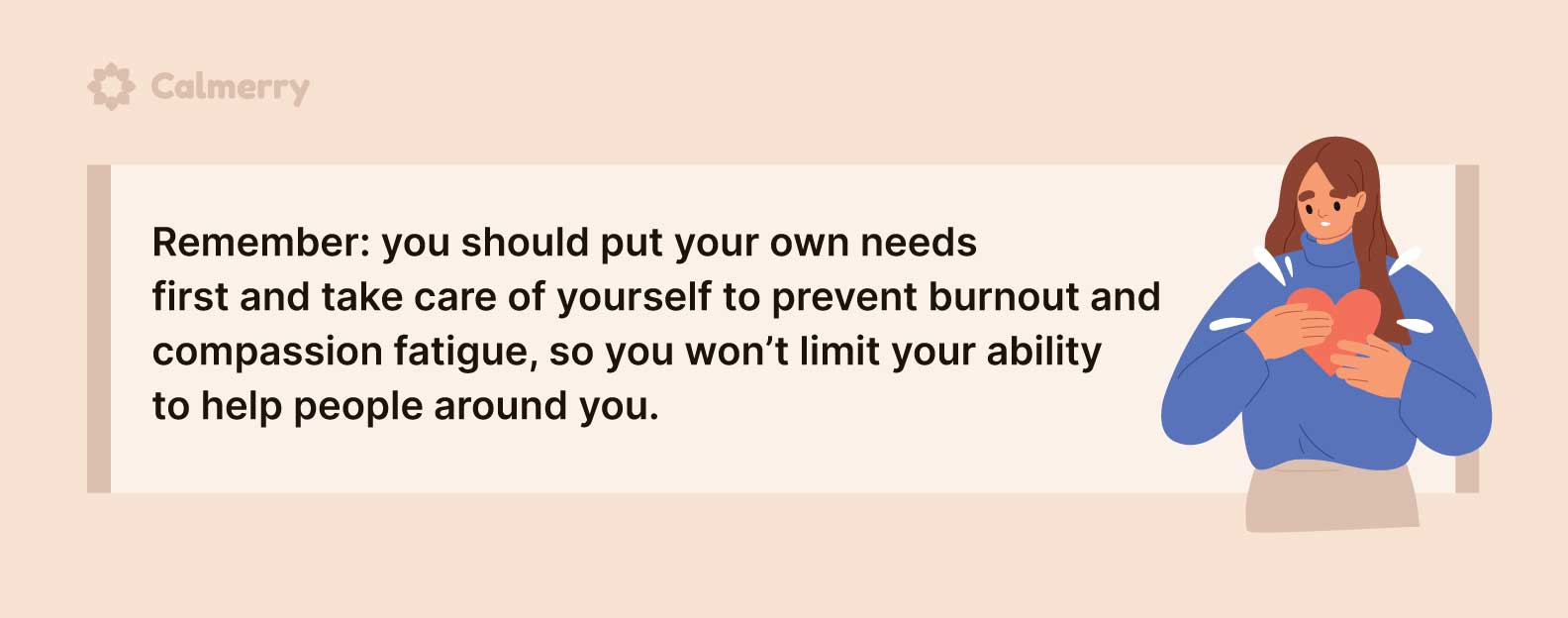
Remember: you should put your own needs first and take care of yourself to prevent burnout and compassion fatigue, so you won’t limit your ability to help people around you.
Make sure you take time away to recharge and refresh. That will help you feel better when you return to the world of caring for other people. Some self-care strategies include taking care of your body by developing healthy lifestyle habits, finding a good friend to talk with, and finding interests that will give you space to let go of the worry.
If you’re starting to feel that your compassion fatigue symptoms are affecting your life, reach out for professional help. Talk with a therapist who specializes in trauma, and they will help you ease the feelings of stress, anxiety, and exhaustion, so you won’t become indifferent to those who are experiencing pain and suffering.
online therapy
live video session



